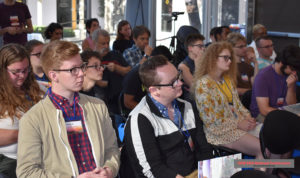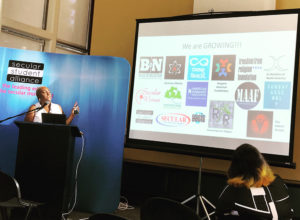Secular Students Are Determined to Be “Better Together”
 Attendees at the 2019 Secular Students Alliance Conference at USC (photo via SSA, view more photos from this event here)
Attendees at the 2019 Secular Students Alliance Conference at USC (photo via SSA, view more photos from this event here) We’ve all heard the stereotype about atheists being lonely because their lack of belief in a god is isolating and renders their lives meaningless. Sure, life can be challenging if you must solve your own problems rather than look to a deity, if there’s no defined afterlife to look forward to, or if you’ve given up counting on one sacred text to provide all the answers. But it can also be freeing to be able to explore all the world has to offer without dogmatic limitations. Being an atheist is especially difficult if your friends and family still hold religious beliefs that don’t allow them to accept your true self and your need to find people who will. Humanist groups are a great way to connect with others who affirm humans’ ability and responsibility to lead ethical lives without dependence on supernaturalism. Gathering in humanist communities proves that we’re not alone and that we’re all valued.
The Secular Student Alliance (SSA) aims to make sure that students—mainly in higher education but also at the secondary level—don’t feel alone as they discover who they are and who they want to be. Along with providing year-round resources (tabling materials, speakers bureau, scholarships, trainings, etc.), the SSA holds an annual conference to connect students from across the country. At the 2019 SSA Conference in Los Angeles from July 12-14, I had the pleasure of meeting student leaders and seeing how well they are supported by each other and the wider secular community.
Students had the opportunity to attend workshops by experts in the secular movement on building community, fundraising, creating secular traditions, defining priorities, navigating conflict, and planning successful events. Other sessions focused on getting involved with elections, fighting against Project Blitz, being an LGBTQ ally, engaging in interfaith actions, and promoting critical thinking. Presenters were also available for questions and discussion throughout the weekend. Students greatly appreciated the chance to talk with each other about their personal stories, shared experiences, group challenges, and ideas for the future.
This year’s conference, headlined “Better Together: Creating Meaningful Community,” was held at the University of Southern California (USC) and hosted by the Office of Religious Life. USC Associate Dean of Religious Life Vanessa Gomez Brake—a humanist chaplain through The Humanist Society and a graduate of the Humanist Studies Program—opened the conference by reassuring students that they’re not alone and, as per the conference theme, are “better together.” This is an important message for students to hear, especially considering a recent LA Times op-ed by Dean of Religious Life at USC Varun Soni, who talked about how he encounters more stress, anxiety, depression, and students in crisis on campus each year. “It needs to be the job of colleges and universities to help students develop resources that enable them to thrive and flourish mentally, emotionally and spiritually,” Soni contends, “so that they may fulfill their academic aspirations and achieve their professional goals.”

Mandisa Thomas speaks at the 2019 SSA Conference in Los Angeles (photo by Emily Newman)
The message of resilience was strong in the inspiring remarks by Mandisa Thomas, co-founder of Black Nonbelievers Inc. and an American Humanist Association board member who accepted the SSA Backbone Award. She spoke of the need for humanists and other secular people—both personally and as a movement—to keep going during difficult times and be vocal to encourage others to be true to themselves. The award celebrates her eight-plus years of dedication to building future secular leadership focused on civil rights, freedom, and equality.
The conference emphasized empathy and respect on many levels. Attendee pronouns were displayed on our nametags, organizers mentioned consent at multiple plenaries, workshops discussed how we can be more inclusive, and several students talked openly about living with depression and anxiety. Presenters discussed how we question our beliefs and develop our values, how we empathize with those in our communities to help them feel heard and understood, and how we strive to empathize and find common ground with those in other communities who disagree with us. In his plenary titled, “Making Space for Empathy & Vulnerability,” Isaac F. Giles, an SSA leader at USC, guided attendees through an exercise on secular identity, purposeful living, secular leadership, and cultural change. Each area contained questions to help two volunteers dive deeper into their personal experiences and the lessons they offer. Then we were divided into groups so we all had time to share and reflect on how our stories compared and differed.
The next generation of secular leaders share many of the same struggles as older atheists and humanists. They live in religious areas or near people who make it uncomfortable to confidently publicize their beliefs and they don’t always feel represented by their elected officials. But instead of yelling and complaining about it, students are taking action. They’re finding ways to serve their communities, do outreach on campus, connect with off-campus groups, and stand up to politicians on the issues they value. Let’s support their work and continue to show that they’re not alone and neither are we—that, in fact, we’re all better together.
